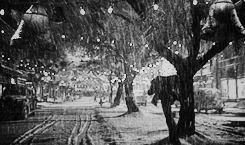I’m an enemy of the unlived meaningless life.
Why do you get out of bed in the morning? Just to roll stones?
Bob Dylan’s 1997 song “Not Dark Yet” offers a keen observation undergirded by profound wisdom. Actually, it offers many keen observations about life and aging while the entire song is undergirded by profound wisdom, but I want to look at just one couplet and the second line of the couplet in particular.
I was born here and I’ll die here against my will
I know it looks like I’m moving, but I’m standing still
In these lines, the singer lets us know that his consciousness can never escape the pull of his origins, that his end will be a return to his beginning. No matter how much he does, no matter how far he goes, his life will end as it began — in opacity, in mystery, even, perhaps, in nothingness. All that movement that fills his life, and he will just end up where he started. Dylan’s view of life is nearly Sisyphean, that is if Sisyphus rolled his boulder up a steep incline just the once, scrambled after it as it tumbled back down, and promptly expired upon reaching the base of the hill.1
Dylan’s lines encompass the entirety of each of our earthly existences, but we experience this frenetic inertness — this spinning-top activity — on a daily basis. As any entrepreneur or anyone else who has undertaken a difficult and complex project can tell you, this idea of standing still while appearing feverishly active is a given. We are all the children of Sisyphus, his little Sisyphi/ae, rolling our stones up our steep inclines only to see them roll down again and again.
Depressing, eh? Maybe discouraging? Perhaps you are thinking right now, “Geez, Jim, way to kill my buzz. Why should I even get out of bed in the morning? After all, I am just going to end up in bed later tonight.”
True enough.
Rollin’, rollin’, rollin’. Keep them doggies rollin’
The French-Algerian philosopher and novelist Albert Camus suggests some relief for our Sisyphean existence by reconceptualizing Sisyphus as rolling his rock to the peak and then heroically, enthusiastically bounding down the hill after it, excited to get back to work.
Absurd, yes?
But there is a difference between the seeming Sisyphean nature of our day to day experience and the eternal torture Sisyphus suffers, and there is a reason, as Camus suggests, for bounding after that rolling stone. Sisyphus had offended the gods by, well, doing lots of things. He was a man too clever by half who outsmarted the gods on a couple of occasions, but he was also just an all around arrogant bad guy. His punishment, then, was fitting since it involved mindless, pointless labor and futility — the opposite of guile and cleverness and a proper comeuppance for arrogance.
In fact, it is that very lack of mental stimulation and autonomy that makes tedious, repetitive work so soul crushing, which is why bosses who regard their employees as nothing more than expendible automatons should spend eternity pushing stones.
But I digress.
I was about to offer some solace in in the midst of our Sisyphean existence. The difference between most of us and Sisyphus is that for us, on occasion, whether at work or in other aspects of our lives, that rock doesn’t quite roll all the way down to the bottom of the hill. Sometimes it establishes a new base, a bit higher than the old base. And sometimes, just sometimes, we can push that rock just a little further, an incremental improvement that we can build on.
I am not being a Pollyanna here. Whatever the case, we still are pushing a rock most of the time, even when we are enjoying ourselves or are making modest progress. It’s just what we do.
We try and we try and we try,
And when we stop,
We die.
Anonymous
My point is that we are not at essence Sisyphuses, not just yet. We can and do make progress no matter how futile it all seems. Then again, one could argue, and I may just argue myself, that, yes, we can achieve things while we live, but as Dylan suggests, don’t we all just find ourselves back where we started in the end? Don’t we come from Idunno and end in Idunno? Whatever your religious convictions on the subject, as a matter of earthly existence and human consciousness, the answer is yes. If you believe in a great beyond, that is a different plane of existence. Even if you believe in reincarnation, it is all a repetition of this plane of existence but not the same experience. Our conscious arrival on this plane is shrouded in mystery as is our departure.
Merry Christmas, you wonderful old building and loan!
Sure enough, we are just rollin’, rollin’, rollin’, but maybe there’s a little more to it. If you have seen Frank Capra’s treacly Christmas movie, It’s a Wonderful Life (1946), you may know where I am going with this. In the movie, George, a small-town moneylender, falls on hard times and, after unwisely mixing his treacle with alcohol, wishes that he had never existed. An angel grants his wish, and George gets to see what the world (or at least his town) would be like without him. It is sort of a twist on Dickens’ “A Christmas Carol,” but with a doofus angel and nice-guy Jimmy Stewart at the center of the action. What George witnesses in this world without him is a town in disarray, and he realizes his life has had meaning in that he had improved the lives of his loved ones and his entire community. And, in a triumphant tear-jerking finale, he is also awarded a leg lamp.
Now had he been a hotdog vendor in New York City rather than a small-town banker, the drama of his non-existence would be dwarfed and dampened enough to ruin the plot, but that does not mean that a hotdog vendor in New York City cannot live a meaningful life. The hotdog vendor’s epiphany just doesn’t make as good a basis for an emotionally manipulative movie.
Existential Neutrality
What I am pushing toward here is a sort of existential equivalent of carbon neutrality. The idea of carbon neutrality is that you offset what ever carbon your behavior releases into the atmosphere. So, as your car spews carbon monoxide on your daily drive to work, you then would plant enough carbon-absorbing trees (11,603?) to counterbalance your pollutant output. In my scheme of existential neutrality, at the very least, you would do enough good in the world in terms of the benevolence you generate, the positives you produce, and the uplift you provide others that it offsets the harm that we all do. In fact, ideally, you would move beyond neutrality and leave the world improved. This improvement has little to do with how many kids you have or whether you have kids at all or how much money you give to charity. It is not about numbers but is a matter of weighing values, contribution, and selflessness. When you reach the top of that hill with your boulder for the last time, what sort of hill do you leave behind? Will you have achieved existential neutrality? Will you have surpassed neutrality and contributed to the betterment of the hill or perhaps its besting?
When all is said and done, when the deal goes down, when it comes time to shed this mortal coil, during your final memorial service, will people attend merely out of obligation, or will they attend out of profound regret for what the world has lost? Or will it be to gloat and to make sure the bastard is really dead?
Each of our existences can be Sisyphean in the extreme, contributing no more (or even less) than we take and reducing or maintaining rather than enhancing the good in the world. Or we can push that boulder a little further each time. Yeah, we will lose ground frequently, but just a little more upward mobility and perhaps we, like George, can finally rest secure in the knowledge that our existence has left the world somewhat better off than how we found it.
Query of the Week
The George Bailey Challenge
What do you think is required of individuals if we are to leave the world better off than how we found it?
Share your thoughts on this topic or open a discussion by leaving a comment below or by contacting me directly by email:
Let me know what you think. I welcome your comments and questions.
Please click on the button below or, if you prefer, email me at jim@jimsalvucci.com.
Post this essay on social media or send it by email to someone you want to intrigue/annoy.
Subscribe to receive my weekly newsletter and special editions directly to your mailbox.
Are you ready to improve your ability to achieve your organizational mission?
Visit my website to learn what I have to offer.
In the ancient tale, Sisyphus is condemned to forever roll a stone up a hill in Hades only to see it roll down again and have to start over. He will never get the relief of death because he is already dead.

















Share this post